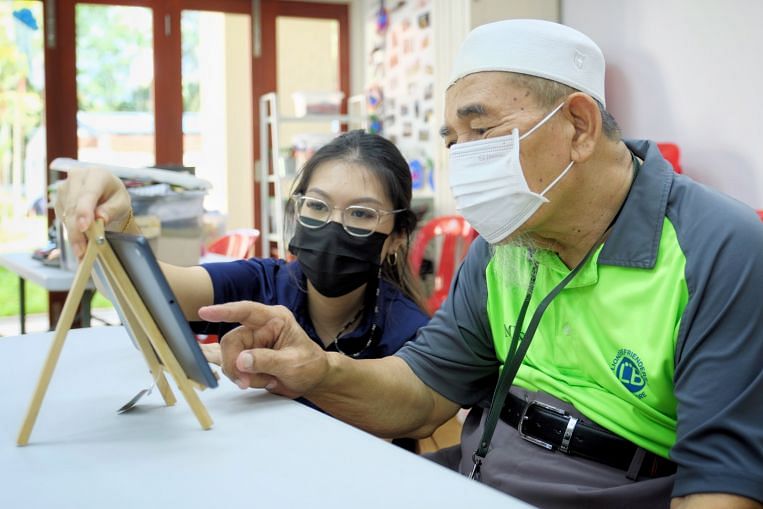From ART Kits to Buying Groceries Online: Why Seniors Struggle With Covid-19 Rules, Health News & Top Stories
[ad_1]
SINGAPORE – When Mr. Zeng, 63, finally got hold of someone on the phone who could help him, he was on the eighth day of an isolation order and was out of food at home .
Crying on the phone, the elder who lives alone in western Singapore told volunteers at the SG Assist social enterprise that he had been surviving on canned food for eight days.
At that time, Mr. Zeng, who works in the cleaning service, was out of rations.
Seniors like him face many challenges when trying to comply with Covid-19 regulations, even though the government has simplified the rules.
The latest guidelines announced by a multi-ministerial task force last Saturday (October 9) said home recovery will be the default arrangement for everyone except partially or unvaccinated people aged 50 and over. , vaccinated seniors aged 80 and over, and children four and under.
Seniors at risk of developing serious illness can recover at Covid-19 treatment facilities that have medical capacity and resources, including oxygen supplementation for patients in need.
These seniors do not have to worry about keeping up with the evolving criteria of the home recovery program.
But they, like the rest of the population, will still have to use rapid antigen test (ART) kits which now form the basis of the Republic’s Covid-19 strategy.
If they receive a message from the Ministry of Health (MOH) stating that they are a close contact of a confirmed case, they are required by law to test themselves with an ART kit and download the results. in line.
Elderly welfare organizations told the Straits Times that many older people did not even have a landline number registered with the Department of Health, making it impossible for them to receive messages.
Ms. Michelle Lau, co-founder of self-help group Kampung Kakis, said older people might not have a fixed mobile line if they use prepaid cards. That means their cell phone numbers change when they change those cards, she said.
The IMDA 2020 annual survey of Infocomm usage notes that only 60% of residents aged 75 and over use smartphones. Older people are also less digital savvy – not knowing how to use Telegram and where support groups, like the SG Quarantine Order Support Group, are based.
Some 16,000 members of the group are discussing issues such as what to do when they have received a quarantine order as a contact of a Covid-19 patient.
More than 50 volunteers also run groceries for people in quarantine and deliver ready meals and rapid antigen test (ART) kits if they don’t have any.
Ms Evonne Tan, 30, who leads the group’s grocery shopping initiative, said that since the group formed two and a half weeks ago, its members have completed 20 of the grocery runs.
The executive said: “We have several requests from people who have been quarantined and who cannot deliver groceries to their elderly parents who live alone.”
However, the group did not receive inquiries from the elderly directly.
To bridge the gap between seniors, SG Assist also has telephone lines for seniors to ask for help.
Such contact numbers can then be broadcast to older people, who often hear about them through word of mouth or share them via WhatsApp.
Referring to Mr. Zeng, SG Assist co-founder Adrian Tan explained why such hotlines are needed: “The senior cannot take care of himself because he has no family support after the death. of his wife. online grocery store and feared he would be fined if he left his apartment. “
Once SG Assist has learned about these seniors, they will then apply for volunteers to do grocery shopping on the SG Assist mobile app.
The People’s Association (PA) has also placed posters in the Marsiling-Yew Tee RCMP, so residents in need know they can receive rations and meals to be delivered by community centers.
In Tampines North, volunteers have also been distributing care kits since last Sunday (October 3) to those on the home recovery program or are in quarantine.
He said that as of October 6, 1,600 PA staff and volunteers had distributed 8,800 care kits to households with residents participating in the home recovery program or QO. Residents who need extra help can also ask for help from PA staff and volunteers.
Ms. Fion Phua, founder of the Keeping Hope Alive volunteer platform, goes door-to-door swabbing seniors living in Housing Commission rental apartments every Sunday and learning more about immunization.
Ms Phua said: “These elderly people don’t know how to use ART kits and don’t have WiFi at home. Some still don’t know that you can walk into a community center and get vaccinated against Covid- 19. “
Lions Befrienders, which serves 7,800 elderly people, has also trained its elderly in the use of ART kits in its centers.
Its chairman, Mr Anthony Tay, said: “There is too much information at the moment. If you have someone who calls you regularly and can lend a listening ear, the elderly feel safe to ask questions. questions they have. “
[ad_2]

